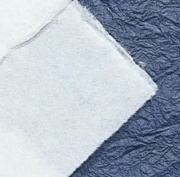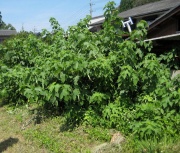Difference between revisions of "Mulberry paper"
Jump to navigation
Jump to search
| (8 intermediate revisions by 3 users not shown) | |||
| Line 1: | Line 1: | ||
[[File:682-2433.jpg|thumb|Mulberry Paper]] | [[File:682-2433.jpg|thumb|Mulberry Paper]] | ||
== Description == | == Description == | ||
| − | + | [[File:Broussonetia papyrifera Texture of the trunk.jpg|thumb|Paper mulberry ''Broussonetia payrifera'')]] | |
An ornamental deciduous tree, ''Broussonetia papyrifera'', native to eastern Asia. The bast fiber from the inner bark of the paper mulberry tree is used in the manufacture of handmade oriental paper called [[kozo]]. The fibers are also used to make cloth called [[tapa]] (Polynesia) or masi (Fiji). | An ornamental deciduous tree, ''Broussonetia papyrifera'', native to eastern Asia. The bast fiber from the inner bark of the paper mulberry tree is used in the manufacture of handmade oriental paper called [[kozo]]. The fibers are also used to make cloth called [[tapa]] (Polynesia) or masi (Fiji). | ||
== Synonyms and Related Terms == | == Synonyms and Related Terms == | ||
| − | Broussonetia papyrifera; kozo; halivun; kalivon; masi (Fiji); deer's tree; mûrier à papier (Fr.) | + | ''Broussonetia papyrifera''; kozo; halivun; kalivon; masi (Fiji); deer's tree; mûrier à papier (Fr.) |
| − | + | [[File:Kozo.jpg|thumb|Paper mulberry]] | |
| − | [[File: | + | == Physical and Chemical Properties == |
| − | |||
| − | |||
| − | == | ||
| − | |||
| − | |||
| − | Fiber width = 6-24 microns with variable thickness and pointed ends. Striations often occur in groups to form nodes. Parenchymal cells are rectangular and often appear to have serrated edges. | + | * Small tree growing to 15 m with round crown. |
| + | * Bark=grayish green with narrow furrows. | ||
| + | * Fiber width = 6-24 microns with variable thickness and pointed ends. | ||
| + | * Striations often occur in groups to form nodes. | ||
| + | * Parenchymal cells are rectangular and often appear to have serrated edges. | ||
| − | + | For paper fiber properties see [[kozo]] | |
| − | + | == Resources and Citations == | |
| − | + | * T.Collings, D. Miller, 'The Identification of Oriental Paper Fibers' ''The Paper Conservator'', vol 3, 1978. | |
* R. J. Gettens, G.L. Stout, ''Painting Materials, A Short Encyclopaedia'', Dover Publications, New York, 1966 | * R. J. Gettens, G.L. Stout, ''Painting Materials, A Short Encyclopaedia'', Dover Publications, New York, 1966 | ||
| Line 29: | Line 28: | ||
* E.J.LaBarre, ''Dictionary and Encyclopedia of Paper and Paper-making'', Swets & Zeitlinger, Amsterdam, 1969 | * E.J.LaBarre, ''Dictionary and Encyclopedia of Paper and Paper-making'', Swets & Zeitlinger, Amsterdam, 1969 | ||
| − | * ''Encyclopedia Britannica'', http://www.britannica.com Comment: "mulberry" | + | * ''Encyclopedia Britannica'', http://www.britannica.com Comment: "mulberry" [Accessed October 24, 2001]. |
| − | * Wikipedia | + | * Wikipedia: http://en.wikipedia.org/wiki/Paper_mulberry (Accessed Dec. 9, 2005) |
[[Category:Materials database]] | [[Category:Materials database]] | ||
Latest revision as of 15:47, 1 October 2022
Description
An ornamental deciduous tree, Broussonetia papyrifera, native to eastern Asia. The bast fiber from the inner bark of the paper mulberry tree is used in the manufacture of handmade oriental paper called Kozo. The fibers are also used to make cloth called Tapa (Polynesia) or masi (Fiji).
Synonyms and Related Terms
Broussonetia papyrifera; kozo; halivun; kalivon; masi (Fiji); deer's tree; mûrier à papier (Fr.)
Physical and Chemical Properties
- Small tree growing to 15 m with round crown.
- Bark=grayish green with narrow furrows.
- Fiber width = 6-24 microns with variable thickness and pointed ends.
- Striations often occur in groups to form nodes.
- Parenchymal cells are rectangular and often appear to have serrated edges.
For paper fiber properties see Kozo
Resources and Citations
- T.Collings, D. Miller, 'The Identification of Oriental Paper Fibers' The Paper Conservator, vol 3, 1978.
- R. J. Gettens, G.L. Stout, Painting Materials, A Short Encyclopaedia, Dover Publications, New York, 1966
- The Dictionary of Paper, American Paper Institute, New York, Fourth Edition, 1980
- E.J.LaBarre, Dictionary and Encyclopedia of Paper and Paper-making, Swets & Zeitlinger, Amsterdam, 1969
- Encyclopedia Britannica, http://www.britannica.com Comment: "mulberry" [Accessed October 24, 2001].
- Wikipedia: http://en.wikipedia.org/wiki/Paper_mulberry (Accessed Dec. 9, 2005)


